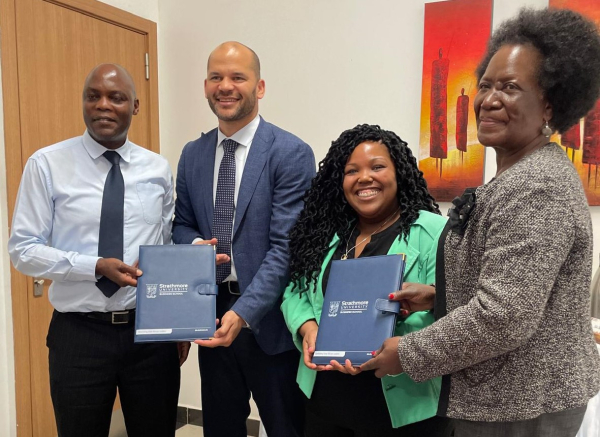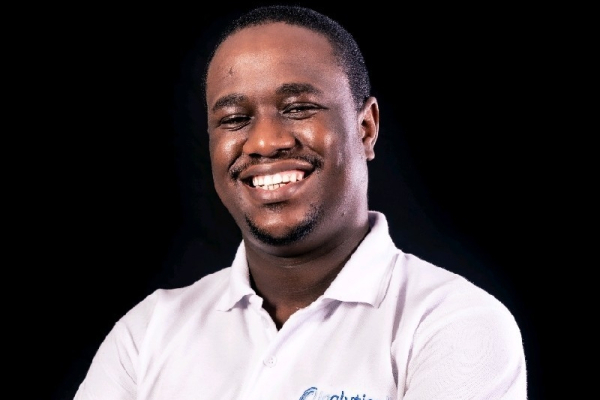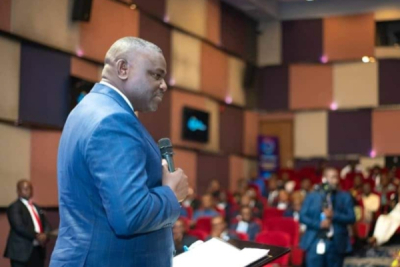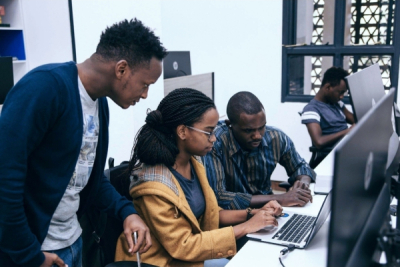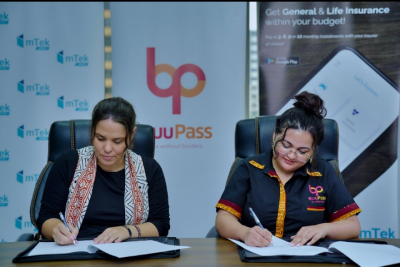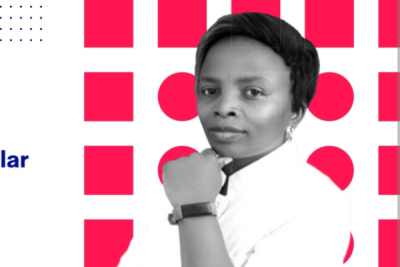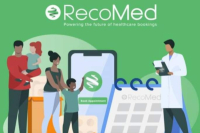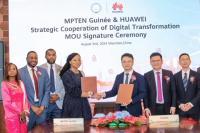Pan-African independent school network Nova Pioneer has partnered with Strathmore University to develop an AI curriculum for K-12 students in Africa, focusing on grades 7-12. The pilot program, part of Nova Pioneer’s Innovation and Leadership Programme, will launch in 2025 for Grade 8 students.
The initiative, announced on August 2, aims to equip African youth with essential AI skills. Over the next five years, the partnership will also create AI Impact Camps and an African Innovation Fund to support students in bringing their ideas to life.
With degrees in finance and human physiology, he turned his focus to the healthcare industry. Using technology, he created an innovative solution to simplify medical bill payments for patients.
Jabulani Nyembe, a South African entrepreneur, is dedicated to improving access to healthcare services for all. He is the founder of Athena, a startup that creates solutions to make healthcare payments more manageable.
Founded in 2022, Athena allows patients to split their healthcare payments through its platform while gaining immediate access to necessary care. It facilitates the financing of co-payments and out-of-pocket medical expenses. With Athena, repayments can be spread over 3 to 6 months, and the startup claims to be more cost-effective than other credit solutions, charging only administrative fees. It helps users develop payment plans for medical expenses ranging from 500 rands (about 27 dollars) to 30,000 rands.
Before launching Athena, Jabulani Nyembe founded Clinalytics in 2018, where he served as CEO until 2022. Clinalytics provides software solutions to private practice physicians, helping them reduce workload, digitize medical records, and utilize analytics tools to improve clinical outcomes.
Nyembe holds a bachelor's degree in human physiology from the University of Pretoria and a bachelor's degree in finance and economics from the University of KwaZulu-Natal. After his studies, he worked as a clinical data analyst and administrator in 2017. In 2018, he joined Amanzi Social Enterprise, an Enactus project aimed at addressing water scarcity in South Africa, as a project manager.
Melchior Koba
African countries are currently undergoing a digital revolution that is profoundly shaping their economic development and social progress. Appropriate regulations play a key role in this transformation.
The digital studies firm Think Tank Law and Technologies has now established offices in the Democratic Republic of Congo (DRC). On Tuesday, August 6, in Kinshasa, the Minister of Posts, Telecommunications, and Digital Affairs, Augustin Kibassa Maliba (photo), officially launched their activities. This initiative aims to promote research and analysis on legal issues related to the digital realm.
"We aim to support and contribute to discussions on digital and technological law. We have conducted studies and analyses on significant legal topics within a technological context. Today, at our official launch, we presented our first study, which focuses on the legal framework for personal data protection in the DRC. This study has led to several recommendations for the government and the private sector," stated Prosper Ntetika, President of Think Tank Law and Technologies.
The bureau's activities include research and analysis on legal and regulatory issues related to digital technologies in the DRC; promoting dialogue and collaboration among experts, researchers, policymakers, and private sector players; contributing to the development of public policies, digital development strategies, and legislation tailored to the DRC's technological context; raising public awareness about the legal and regulatory challenges of digital technologies; and providing training in technology law, among other things.
The launch of the bureau's activities comes as the DRC pursues the objectives of the National Digital Plan – Horizon 2025, where the legal framework is a crucial pillar. According to President Félix Tshisekedi, establishing a solid institutional and legal framework is necessary to govern and regulate this particularly promising sector.
With its team of legal experts, Think Tank Law and Technologies is well-positioned to assist the DRC in creating a robust regulatory and institutional framework. This support is vital for fostering the country's digital development, ensuring legislation that keeps pace with technological advancements, and effectively protecting citizens' rights in the digital age.
Samira Njoya
Funding for African startups has been plummeting for months. However, the July 2024 figures suggest a potential rebound, as it marks the best month for the African tech ecosystem since May 2023 when $596 million was raised.
African startups raised $420 million in July 2024, according to Africa: The Big Deal, a database tracking funding over $100,000 secured by the continent’s startups, as reported on Tuesday, August 6.
"Indeed, with $420 million raised (exc. exits), this is the highest monthly performance of the ecosystem in 14 months; more than what was raised in the whole of Q2; and 2.5x times the average monthly amount raised over the past 12 months," explained Africa: The Big Deal.
This surge in funding comes amid months of dwindling financing in the African tech ecosystem. While July saw a significant uptick due to three major deals, it remains to be seen if this marks a sustained trend.
The three deals that contributed to the rise includes a $176 million financing for d.light, a Kenya-based startup providing solar energy solutions; $157.5 million for Egyptian fintech unicorn MNT-Halan; and $40 million for Tanzanian fintech Nala. These three transactions accounted for $373.5 million, or 88.9% of the $420 million raised in July 2024.
Over the said period 47 startups raised at least $100,000, with 16 of them securing at least $1 million.
Adoni Conrad Quenum
Kenyan digital insurance platform mTek has partnered with BuuPass, a Kenyan Transportation platform, to provide integrated travel insurance. This partnership allows customers to easily select and purchase insurance while booking tickets on BuuPass, enhancing convenience and safety.
The move aims to enhance travel experience by providing additional safety and financial protection, allowing travelers to feel more secure and confident during their trips.
An experienced nurse, she is committed to democratizing healthcare in Africa. A few years ago, she founded an innovative company that leverages technology to simplify access to nursing services.
Ginyu Innocentia Kwalar is a Cameroonian nurse and entrepreneur. She is the founder and CEO of Klarah, a startup dedicated to providing quality, affordable, and accessible healthcare to every African. Founded in 2021, Klarah connects experienced nurses to with patients through mobile applications and interactive dashboards. "We are leveraging technology to match nurses to patients so that quality healthcare can be offered in the comfort of their homes," explained Ginyu Innocentia Kwalar in 2023.
Klarah's nurses are trained to simplify medical jargon, discuss health issues, and help patients ask relevant questions about their well-being. The startup offers a range of services, including wound care, health check-ups, diabetic and hypertension care, post-hospitalization care, and patient education. Currently, Klarah has 400 dedicated nurses providing patient care.
Ginyu Innocentia Kwalar is also an assistant lecturer at the University of Buea, where she earned a bachelor's degree in nursing in 2001 and a PhD in public health in 2022. She holds a master's degree in internal medicine from the University of Yaoundé 1, obtained in 2008. To gain experience, she worked as a nurse at Nkambe District Hospital from 2003 to 2010. From 2013 to 2021, she served as a senior nurse at Buea Regional Hospital, where she was in charge of the emergency and outpatient units.
Melchior Koba
E-health solutions are rapidly spreading across Africa, offering promising ways to expand healthcare access in continent.
RecoMed is a South African e-health platform founded in 2013 by Sheraan Amod to connect patients with healthcare providers across the country.
Its web-based platform allows users to search for doctors and book appointments online. It also offers a pharmacy service, with options for delivery or in-store pickup. RecoMed has no mobile app.
To help medical practices expand their reach, the startup offers a white-label solution that integrates with existing practice management software. “Our white label solution combines your provider base and RecoMed’s rich booking functionality with seamless PMA workflow integration. This scalable solution will increase bookings, improve efficiency, and boost patient convenience and satisfaction,” RecoMed states.
The platform claims over 100,000 online bookings, 200,000 monthly visitors, and 20,000 patient recommendations each month. It also works with 3,000 healthcare providers in cities including Pretoria, Johannesburg, Cape Town, and Durban.
Adoni Conrad Quenum
A computer science graduate, he focuses on creating mobile games inspired by African culture. As the head of Qene Games, he has developed two award-winning games.
Dawit Abraham (photo), an Ethiopian computer scientist and tech entrepreneur, is the co-founder and CEO of Qene Games, a mobile game publishing company based in Ethiopia.
Founded in 2016, Qene Games aims to showcase the richness and beauty of Ethiopian culture in the global gaming and entertainment industry. The startup has launched two mobile games so far.
Kukulu, their first game, is a 3D runner where the player, represented by a rooster, must escape a farmer by jumping over fences and running through bushes. Their second game, Gebeta, is a mobile board game based on the principles of mancala games (awélé, bao, kalaha, etc.). Gebeta was later acquired by the pan-African mobile game publisher Carry1st.
Kukulu won the AppsAfrica award for Best Media and Entertainment App in 2018, while Gebeta was awarded the AppsAfrica prize for Best App of the Year in 2020.
Dawit is also a co-founder and spokesperson for the Pan Africa Gaming Group, a network established in 2022 that brings together top video game development talents in Africa. In 2023, he became the co-founder and CEO of Beemi, an interactive streaming platform focused on games.
After graduating from Addis Ababa University with a bachelor's degree in electrical and computer engineering, Dawit's career began in 2015 at iCog-Labs, an Ethiopian R&D company specializing in AI and robotics, where he worked as a game developer and machine learning programmer. In 2020, he was a game developer at Turing, a U.S.-based AI company, and then joined the International Finance Corporation as a product development advisor from 2020 to 2023.
Melchior Koba
The government aims to develop the ICT sector and create a digital government that serves all Guineans by 2027.
The Chinese technology firm Huawei will support Guinea in its digital transformation. The support aims to implement robust innovative digital infrastructure to promote widespread access to ICT in Guinea. It was officialized by a memorandum of understanding signed, on Friday August 2nd, during the China-Africa Digital Cooperation Forum recently held in Beijing, China.
Under this agreement, Huawei will assist Guinea in deploying high-speed networks, including fiber optics, to improve connectivity in both urban and rural areas. It also involves helping the country implement e-government solutions to streamline administrative processes and enhance the efficiency of public services. Other projects include developing digital platforms, data centers, and innovation hubs; establishing training and research programs in ICT and digital fields; and strengthening cybersecurity.
The signing of this memorandum of understanding is the result of recent discussions between Rose Pola Pricemou, Guinea’s Minister of Digital Affairs, and a delegation from Huawei, led by its General Manager in Guinea. During these discussions, both parties explored collaboration opportunities, focusing on information systems (SMSI), strengthening the fiber optic backbone, and extending Internet coverage in underserved rural areas.
Huawei's new commitment to Guinea is expected to not only improve the quality and coverage of connectivity services in the country but also reduce their costs. According to the latest official statistics, the country has 7.7 million internet subscribers, with a penetration rate of 56.27%. Guinea, which recently received $60 million from the World Bank for digital projects, hopes to achieve a qualitative leap in its digital transformation through this partnership.
Samira Njoya
As African economies increasingly rely on digital technologies for growth, secure and reliable internet access becomes vital. Enhancing cybersecurity and digital trust helps facilitate online transactions, attract foreign investment, and support economic diversification.
The World Bank announced, on July 29, a call for expressions of interest for a project in Cameroon to strengthen digital trust and boost online transaction security. The initiative seeks experts in cybersecurity policy, capacity assessments, trust frameworks, e-transactions, e-signatures, and public key infrastructure. Proposals are due by August 12.
The consultant will assist in updating Cameroon's National Cybersecurity Strategy from 2018, enhance the regulatory framework for e-signatures, and establish a public key infrastructure. Responsibilities include conducting gap analyses, providing policy recommendations, and hosting capacity-building workshops for government officials.
Selection criteria include the firm's experience, expertise, technical and management skills, and key personnel qualifications. The project is scheduled to begin in September 2024 and is expected to last for nine months.
Cameroon has made strides in establishing a trust framework for online transactions, including the 2010 Law on Cybersecurity and Cybercrime (2010-012), the Law on E-commerce (2010-021), and the 2019 Decree (2019-150) on the National Agency for Information and Communication Technologies (ANTIC). ANTIC regulates cybersecurity and electronic activities. However, the National Cybersecurity Strategy from 2018 remains only partially implemented.
While Cameroon’s legal and regulatory framework reflects a commitment to a secure digital environment, the incomplete implementation of the National Cybersecurity Strategy highlights a governance gap. The World Bank’s call for expert support is vital for refining these efforts and enhancing digital trust and security. Updating the cybersecurity law to address threats like DeepFakes is crucial for protecting citizens and aligning with international standards, thereby strengthening justice and trust in the digital era.
Hikmatu Bilali
More...
Pan-African fintech firm Flutterwave has been granted an Enhanced Category Payment Service Provider license by the Bank of Ghana, it announced on August 1. This license enables Flutterwave to offer a wide range of payment services directly in Ghana, eliminating the need for third-party services and simplifying payment processes for businesses and consumers.
The firm aims to unify the fragmented payment infrastructure in Africa and support local fintech companies, contributing to a more integrated financial ecosystem.
After completing his higher education in France, he worked on artificial intelligence projects for companies such as Facebook and Google. Now an entrepreneur, he leverages his expertise to improve access to healthcare services in Africa.
Moustapha Cisse (photo), a Senegalese expert in artificial intelligence and machine learning, founded Kera Health Platforms in 2023, a startup that develops a digital health platform powered by artificial intelligence (AI), where he serves as CEO. Kera Health Platforms connects healthcare providers with communities to promote healthier lives in Africa and beyond.
The idea for this startup dates back to 2004 when Moustapha Cisse, then 19 years old, fell seriously ill. His condition worsened due to a misdiagnosis and inappropriate treatment. "I had been misdiagnosed, and what I was being treated for was slowly killing me. I was eventually correctly diagnosed and treated, and through a long process, I recovered. That was one of the most difficult experiences of my lifetime and left me deeply curious about how something like that could happen. I went to university and studied math, physics, and artificial intelligence. Still, I was curious about the health sector and knew there was an opportunity to leverage technology to solve some of Africa’s most pressing healthcare needs," he recounted in May 2024.
Moustapha Cisse is a professor of machine learning at the African Institute of Mathematical Sciences. In 2018, he founded the African Masters of Machine Intelligence, a graduate program in AI that he has directed ever since.
A graduate of Pierre and Marie Curie University in France, Moustapha Cisse earned a master's degree in artificial intelligence in 2010 and a Ph.D. in computer science in 2014. In 2016, he joined Facebook as an AI researcher. In 2018, he co-founded and led until June 2023, Google's first AI engineering and research center in Africa, located in Accra, Ghana.
Melchior Koba
Since 2016, the International Telecommunication Union (ITU) has been encouraging African governments to improve internet access in rural areas. Côte d'Ivoire is working to address this challenge through various initiatives.
The Ivorian government on Friday launched an initiative to bring internet access to rural communities across the country.
Ibrahim Kalil Konaté, Minister of Digital Transition and Digitalization, officially kicked off the program in Djébékaha, a town in the Napié sub-prefecture. The project aims to connect 175 rural localities.
The program, part of the first phase of the World Bank-funded Digital Solutions Project for Opening Up Rural Areas and E-Agriculture (PSDEA), involves building 160 towers to improve connectivity in the Bagoué, Poro, Folon, Bounkani, Tchologo, and Marahoué regions. The PSDEA, launched in 2018, has received $63.2 million in World Bank funding to bridge the digital divide and promote digital agriculture.
The government plans to connect an additional 240 localities in the second phase of the project. A third phase, scheduled for 2025, will connect 160 more, bringing the total to 575 connected rural communities. This will provide thousands of Ivorians with access to online public services, telemedicine, and digital economic opportunities.
Rural connectivity is one of the flagship projects in the 2024 budget allocated to the Ministry of Digital Transition and Digitalization. This budget, amounting to XOF55.6 billion, aims to attract more investments, digitize citizen services, extend digital connectivity in uncovered rural areas, and develop inclusive digital skills nationwide.
Samira Njoya
The digital transformation of judicial systems in Africa holds significant importance for the continent's development. Digital systems reduce the need for physical paperwork, court visits, and administrative tasks, leading to considerable cost savings for the judiciary and litigants. This is particularly beneficial in resource-constrained environments.
Starting August 12, 2024, all urgent applications in the South African Labour Court will be submitted through the Court Online System. Acting Judge President of the Labour Court, Edwin Mogomotsi Molahlehi, announced in a directive signed July 31 that the Office of the Chief Justice has established this e-filing solution for the country's superior courts.
The system allows law firms and litigants to file petitions and documents online and manage court schedules and evidence in real time. Judge Molahlehi clarified that "all urgent applications in the Labour Court will be initiated on Court Online from the specified date. Unless otherwise directed, existing cases cannot be initiated on Court Online." The Court Online System is a comprehensive platform for South Africa's High Courts that facilitates E-Filing, Digital Case Management, and Evidence Management. It enables the electronic sharing and filing of documents, streamlines the inspection of documents, and provides fast, accurate, real-time updates on case statuses.
The South African government has been investing in ICT infrastructure, with digital government services becoming a key focus. For example, the South African National Development Plan envisions increased access to electronic services by 2030.
In the 2023 Network Readiness Index (NRI), which assesses the application and impact of information and communication technology (ICT) across global economies, South Africa is ranked 74th out of 134 countries. The country holds the 2nd position in Africa. South Africa demonstrated strong performance across four key pillars: Technology (including Access, Content, and Future Technologies), People (encompassing Individuals, Businesses, and Governments), Governance (covering Trust, Regulation, and Inclusion), and Impact (focusing on Economy, Quality of Life, and Sustainable Development Goals contribution).
Hikmatu Bilali


